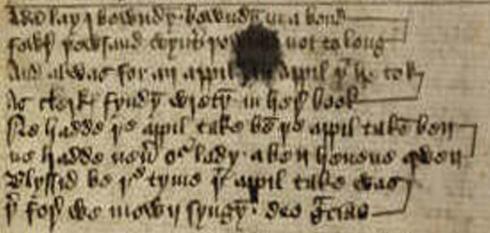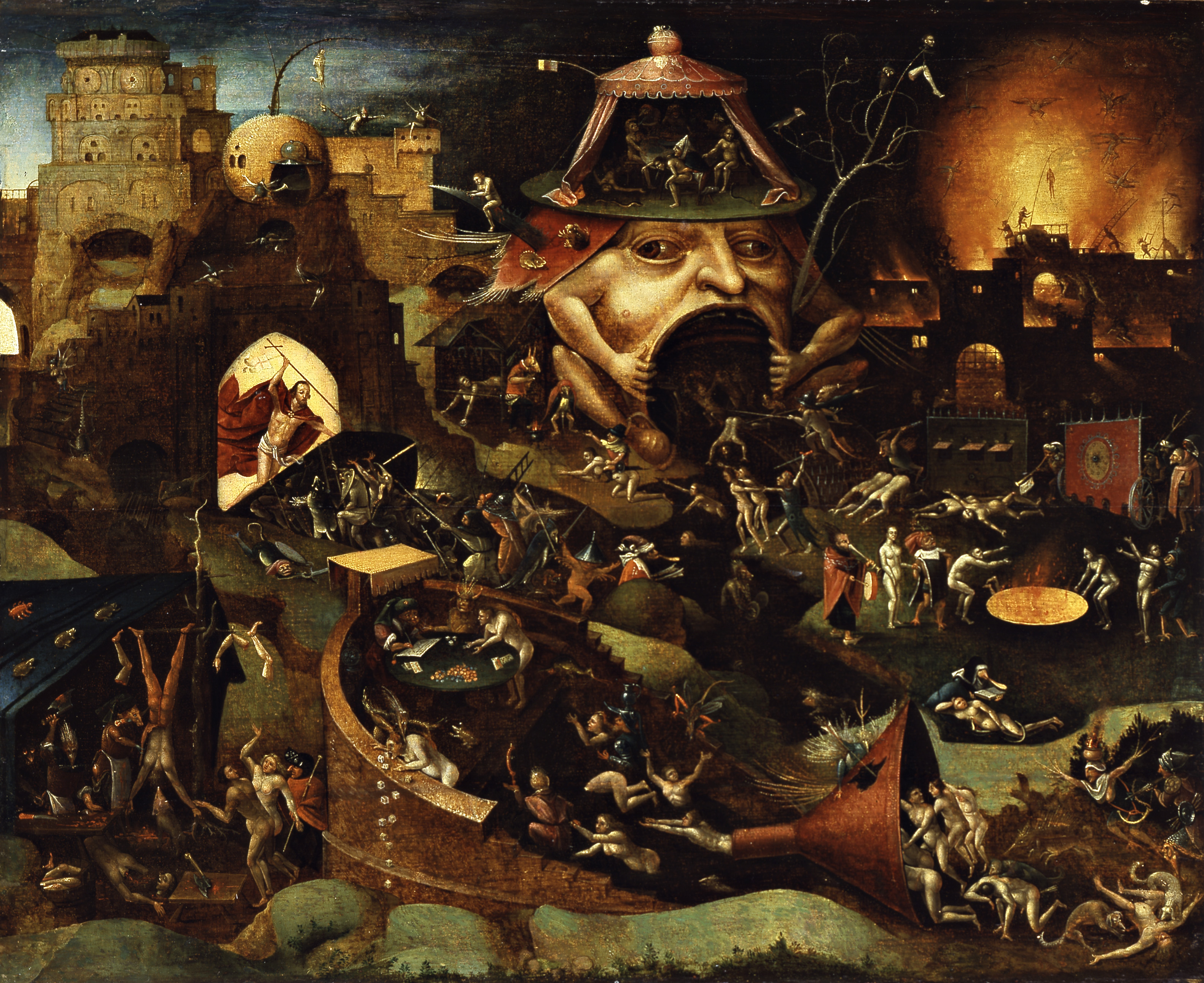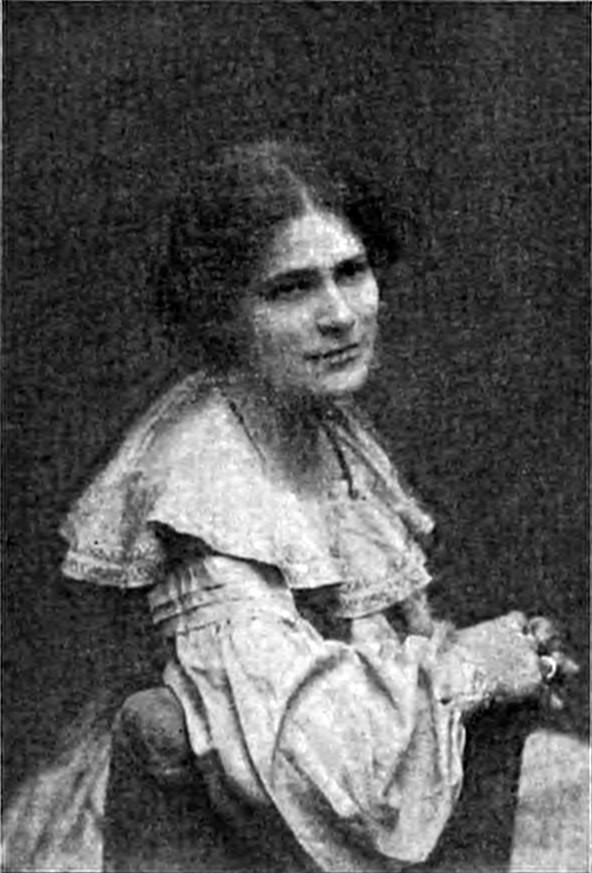|
Adam Lay Ybounden
"Adam lay ybounden", originally titled Adam lay i-bowndyn, is a 15th-century English Christian text of unknown authorship. It relates the Biblical events of Genesis, Chapter 3 on the Fall of Man. Originally a song text, no contemporary musical settings survive, although there are many notable modern choral settings of the text, such as that by Boris Ord. Origins The manuscript on which the poem is found (Sloane MS 2593, ff. 10v-11) is held by the British Library, who date the work to c.1400 and speculate that the lyrics may have belonged to a wandering minstrel; other poems included on the same page in the manuscript include "I have a gentil cok", the famous lyric poem " I syng of a mayden" and two riddle songs – "A minstrel's begging song" and "I have a yong suster". Analysis of their dialect by K.R. Palti (2008) places them within the song tradition of East Anglia and more specifically Norfolk; two further carol manuscripts from the county contain songs from Sloane MS 2593. ... [...More Info...] [...Related Items...] OR: [Wikipedia] [Google] [Baidu] |
Adam Lay Ybounden
"Adam lay ybounden", originally titled Adam lay i-bowndyn, is a 15th-century English Christian text of unknown authorship. It relates the Biblical events of Genesis, Chapter 3 on the Fall of Man. Originally a song text, no contemporary musical settings survive, although there are many notable modern choral settings of the text, such as that by Boris Ord. Origins The manuscript on which the poem is found (Sloane MS 2593, ff. 10v-11) is held by the British Library, who date the work to c.1400 and speculate that the lyrics may have belonged to a wandering minstrel; other poems included on the same page in the manuscript include "I have a gentil cok", the famous lyric poem " I syng of a mayden" and two riddle songs – "A minstrel's begging song" and "I have a yong suster". Analysis of their dialect by K.R. Palti (2008) places them within the song tradition of East Anglia and more specifically Norfolk; two further carol manuscripts from the county contain songs from Sloane MS 2593. ... [...More Info...] [...Related Items...] OR: [Wikipedia] [Google] [Baidu] |
Limbus Patrum
In Catholic theology, Limbo (Latin ''limbus'', edge or boundary, referring to the edge of Hell) is the afterlife condition of those who die in original sin without being assigned to the Hell of the Damned. Medieval theologians of Western Europe described the underworld ("hell", "hades", "infernum") as divided into three distinct parts: Hell of the Damned,''Catholic Encyclopedia'': Hell "However, in the New Testament the term is used more frequently in preference to hades, as a name for the place of punishment of the damned. … held in abomination by the Jews, who, accordingly, used the name of this valley to designate the abode of the damned (Targ. Jon., Gen., iii, 24; Henoch, c. xxvi). And Christ adop ... [...More Info...] [...Related Items...] OR: [Wikipedia] [Google] [Baidu] |
Adam Lay Y Bounden
Adam; el, Ἀδάμ, Adám; la, Adam is the name given in Genesis 1-5 to the first human. Beyond its use as the name of the first man, ''adam'' is also used in the Bible as a pronoun, individually as "a human" and in a collective sense as "mankind". tells of God's creation of the world and its creatures, including ''adam'', meaning humankind; in God forms "Adam", this time meaning a single male human, out of "the dust of the ground", places him in the Garden of Eden, and forms a woman, Eve, as his helpmate; in Adam and Eve eat the fruit of the tree of knowledge and God condemns Adam to labour on the earth for his food and to return to it on his death; deals with the birth of Adam's sons, and lists his descendants from Seth to Noah. The Genesis creation myth was adopted by both Christianity and Islam, and the name of Adam accordingly appears in the Christian scriptures and in the Quran. He also features in subsequent folkloric and mystical elaborations in later Judaism, ... [...More Info...] [...Related Items...] OR: [Wikipedia] [Google] [Baidu] |
Deo Gratias
' (Latin for "thanks [be] to God") is a Response (liturgy), response in the Tridentine Mass, Latin Mass, derived from the Vulgate text of 1 Corinthians :la:s:Biblia Sacra Vulgata (Stuttgartensia)/ad Corinthios I#15:57, 15:57 and 2 Corinthians :la:s:Biblia Sacra Vulgata (Stuttgartensia)/ad Corinthios II#2:14, 2:14. Description It occurs in the Mass *as an answer of the server to the Epistle#Liturgical use, Epistle or Lectionary, Prophecies; in Solemn Mass, High Mass this answer should not be sung by the choir. In the Mozarabic Breviary, Mozarabic and Gallican Rite the ''Deo gratias'' follows the title of the Epistle or the Prophecy; at its end the ''Amen'' is said. The Orthodox churches do not use this formula in connection with the Epistle. In the Latin Church the ''Deo gratias'' is not said on Ember Saturday after the fifth lection, lesson, which is followed by the canticle of the ''Three Young Men in the furnace'', in order not to interrupt the sense; neither is it said afte ... [...More Info...] [...Related Items...] OR: [Wikipedia] [Google] [Baidu] |
Cleric
Clergy are formal leaders within established religions. Their roles and functions vary in different religious traditions, but usually involve presiding over specific rituals and teaching their religion's doctrines and practices. Some of the terms used for individual clergy are clergyman, clergywoman, clergyperson, churchman, and cleric, while clerk in holy orders has a long history but is rarely used. In Christianity, the specific names and roles of the clergy vary by denomination and there is a wide range of formal and informal clergy positions, including deacons, elders, priests, bishops, preachers, pastors, presbyters, ministers, and the pope. In Islam, a religious leader is often known formally or informally as an imam, caliph, qadi, mufti, mullah, muezzin, or ayatollah. In the Jewish tradition, a religious leader is often a rabbi (teacher) or hazzan (cantor). Etymology The word ''cleric'' comes from the ecclesiastical Latin ''Clericus'', for those belonging ... [...More Info...] [...Related Items...] OR: [Wikipedia] [Google] [Baidu] |
Forbidden Fruit
Forbidden fruit is a name given to the fruit growing in the Garden of Eden which God commands mankind not to eat. In the biblical story, Adam and Eve eat the fruit from the tree of the knowledge of good and evil and are exiled from Eden. As a metaphor outside of the Abrahamic religions the phrase typically refers to any indulgence or pleasure that is considered illegal or immoral. Biblical story The story of the Book of Genesis places the first man and woman, Adam and Eve, in the Garden of Eden where they may eat the fruit of many trees, but are forbidden by God to eat from the tree of knowledge of good and evil. In Genesis 3, a serpent tempts the woman: Desiring this knowledge, the woman eats the forbidden fruit and gives some to the man who also eats it. They become aware of their "nakedness" and make fig-leaf clothes, and hide themselves when God approaches. When confronted, Adam tells God that Eve gave him the fruit to eat, and Eve tells God the serpent deceived her in ... [...More Info...] [...Related Items...] OR: [Wikipedia] [Google] [Baidu] |
Edith Rickert
Edith Rickert (1871–1938) was a medieval scholar at the University of Chicago. Her work includes the ''Chaucer Life-Records'' and the eight-volume ''Text of the Canterbury Tales'' (1940). Rickert was born in Dover, Ohio, to Francis E. Rickert, a pharmacist, and Caroline Josephine Newburgh. She was a member of Vassar College's class of 1891. Rickert's name and achievements are linked with those of John M. Manly (1865–1940). Close colleagues and collaborators for some 40 years at the University of Chicago, they worked jointly on the C''haucer Life-Records'' and the ''Text of the Canterbury Tales'', which took sixteen years to complete, the first volume of which Rickert did not live to see published. Manly, president of the Modern Language Association of America (1920) and later of the Medieval Academy of America (1929–30), was posthumously recognized by being awarded such honors as the Haskins Medal for his work on the Chaucer manuscripts. Rickert, however, was eclipsed by Ma ... [...More Info...] [...Related Items...] OR: [Wikipedia] [Google] [Baidu] |
Felix Culpa
''Felix culpa'' is a Latin phrase that comes from the words ''felix,'' meaning "happy," "lucky," or "blessed" and ''culpa,'' meaning "fault" or "fall". In the Catholic tradition, the phrase is most often translated "happy fault", as in the Catholic Exsultet. Other translations include "blessed fall" or "fortunate fall". Philosophy of religion As a theological concept, ''felix culpa'' is a way of understanding the Fall as having positive outcomes, such as the redemption of mankind through the death and resurrection of Jesus Christ. The concept is paradoxical in nature as it looks at the fortunate consequences of an unfortunate event, which would never have been possible without the unfortunate event in the first place. In the philosophy of religion, ''felix culpa'' is considered as a category of theodicy in response to the problem of evil. As an interpretation of the Fall, the concept differs from orthodox interpretations which often emphasize negative aspects of the Fall, such a ... [...More Info...] [...Related Items...] OR: [Wikipedia] [Google] [Baidu] |
Thomas Aquinas
Thomas Aquinas, OP (; it, Tommaso d'Aquino, lit=Thomas of Aquino; 1225 – 7 March 1274) was an Italian Dominican friar and priest who was an influential philosopher, theologian and jurist in the tradition of scholasticism; he is known within the tradition as the , the , and the . The name ''Aquinas'' identifies his ancestral origins in the county of Aquino in present-day Lazio, Italy. Among other things, he was a prominent proponent of natural theology and the father of a school of thought (encompassing both theology and philosophy) known as Thomism. He argued that God is the source of both the light of natural reason and the light of faith. He has been described as "the most influential thinker of the medieval period" and "the greatest of the medieval philosopher-theologians". His influence on Western thought is considerable, and much of modern philosophy is derived from his ideas, particularly in the areas of ethics, natural law, metaphysics, and political theory. ... [...More Info...] [...Related Items...] OR: [Wikipedia] [Google] [Baidu] |
Queen Of Heaven
Queen of Heaven ( la, Regina Caeli) is a title given to the Virgin Mary, by Christians mainly of the Catholic Church and, to a lesser extent, in Anglicanism, Lutheranism, and Eastern Orthodoxy. The Catholic teaching on this subject is expressed in the papal encyclical ''Ad Caeli Reginam'', issued by Pope Pius XII in 1954. It states that Mary is called Queen of Heaven because her son, Jesus Christ, is the king of Israel and the heavenly king of the universe; indeed, the Davidic tradition of Israel recognized the mother of the king as the queen mother of Israel. The title "Queen of Heaven" has long been a Catholic tradition, included in prayers and devotional literature and seen in Western art in the subject of the Coronation of the Virgin from the High Middle Ages, long before it was given a formal definition status by the Church. Theological basis Queen of Heaven ( la, Regina Caeli) is one of many Queen titles used of Mary, mother of Jesus. The title derived in part from the ... [...More Info...] [...Related Items...] OR: [Wikipedia] [Google] [Baidu] |
Mary The Mother Of Jesus
Mary; arc, ܡܪܝܡ, translit=Mariam; ar, مريم, translit=Maryam; grc, Μαρία, translit=María; la, Maria; cop, Ⲙⲁⲣⲓⲁ, translit=Maria was a first-century Jewish woman of Nazareth, the wife of Joseph and the mother of Jesus. She is a central figure of Christianity, venerated under various titles such as virgin or queen, many of them mentioned in the Litany of Loreto. The Eastern and Oriental Orthodox, Church of the East, Catholic, Anglican, and Lutheran churches believe that Mary, as mother of Jesus, is the Mother of God. Other Protestant views on Mary vary, with some holding her to have considerably lesser status. The New Testament of the Bible provides the earliest documented references to Mary by name, mainly in the canonical Gospels. She is described as a young virgin who was chosen by God to conceive Jesus through the Holy Spirit. After giving birth to Jesus in Bethlehem, she raised him in the city of Nazareth in Galilee, and was in Jerusalem a ... [...More Info...] [...Related Items...] OR: [Wikipedia] [Google] [Baidu] |
Jesus Christ
Jesus, likely from he, יֵשׁוּעַ, translit=Yēšūaʿ, label=Hebrew/Aramaic ( AD 30 or 33), also referred to as Jesus Christ or Jesus of Nazareth (among other names and titles), was a first-century Jewish preacher and religious leader; he is the central figure of Christianity, the world's largest religion. Most Christians believe he is the incarnation of God the Son and the awaited Messiah (the Christ) prophesied in the Hebrew Bible. Virtually all modern scholars of antiquity agree that Jesus existed historically. Research into the historical Jesus has yielded some uncertainty on the historical reliability of the Gospels and on how closely the Jesus portrayed in the New Testament reflects the historical Jesus, as the only detailed records of Jesus' life are contained in the Gospels. Jesus was a Galilean Jew who was circumcised, was baptized by John the Baptist, began his own ministry and was often referred to as "rabbi". Jesus debated with fellow Jews on ho ... [...More Info...] [...Related Items...] OR: [Wikipedia] [Google] [Baidu] |








